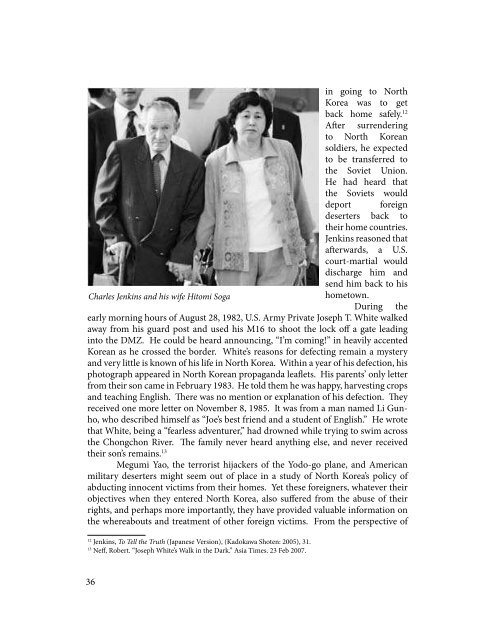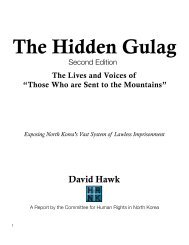Taken! - US Committee for Human Rights in North Korea
Taken! - US Committee for Human Rights in North Korea
Taken! - US Committee for Human Rights in North Korea
- No tags were found...
You also want an ePaper? Increase the reach of your titles
YUMPU automatically turns print PDFs into web optimized ePapers that Google loves.
<strong>in</strong> go<strong>in</strong>g to <strong>North</strong><strong>Korea</strong> was to getback home safely. 12After surrender<strong>in</strong>gto <strong>North</strong> <strong>Korea</strong>nsoldiers, he expectedto be transferred tothe Soviet Union.He had heard thatthe Soviets woulddeport <strong>for</strong>eigndeserters back totheir home countries.Jenk<strong>in</strong>s reasoned thatafterwards, a U.S.court-martial woulddischarge him andsend him back to hisCharles Jenk<strong>in</strong>s and his wife Hitomi Sogahometown.Dur<strong>in</strong>g theearly morn<strong>in</strong>g hours of August 28, 1982, U.S. Army Private Joseph T. White walkedaway from his guard post and used his M16 to shoot the lock off a gate lead<strong>in</strong>g<strong>in</strong>to the DMZ. He could be heard announc<strong>in</strong>g, “I’m com<strong>in</strong>g!” <strong>in</strong> heavily accented<strong>Korea</strong>n as he crossed the border. White’s reasons <strong>for</strong> defect<strong>in</strong>g rema<strong>in</strong> a mysteryand very little is known of his life <strong>in</strong> <strong>North</strong> <strong>Korea</strong>. With<strong>in</strong> a year of his defection, hisphotograph appeared <strong>in</strong> <strong>North</strong> <strong>Korea</strong>n propaganda leaflets. His parents’ only letterfrom their son came <strong>in</strong> February 1983. He told them he was happy, harvest<strong>in</strong>g cropsand teach<strong>in</strong>g English. There was no mention or explanation of his defection. Theyreceived one more letter on November 8, 1985. It was from a man named Li Gunho,who described himself as “Joe’s best friend and a student of English.” He wrotethat White, be<strong>in</strong>g a “fearless adventurer,” had drowned while try<strong>in</strong>g to swim acrossthe Chongchon River. The family never heard anyth<strong>in</strong>g else, and never receivedtheir son’s rema<strong>in</strong>s. 13Megumi Yao, the terrorist hijackers of the Yodo-go plane, and Americanmilitary deserters might seem out of place <strong>in</strong> a study of <strong>North</strong> <strong>Korea</strong>’s policy ofabduct<strong>in</strong>g <strong>in</strong>nocent victims from their homes. Yet these <strong>for</strong>eigners, whatever theirobjectives when they entered <strong>North</strong> <strong>Korea</strong>, also suffered from the abuse of theirrights, and perhaps more importantly, they have provided valuable <strong>in</strong><strong>for</strong>mation onthe whereabouts and treatment of other <strong>for</strong>eign victims. From the perspective oflearn<strong>in</strong>g about the lives of the abductees, very important <strong>in</strong><strong>for</strong>mation came fromthe partisan Megumi Yao and the American defector Charles M. Jenk<strong>in</strong>s. Jenk<strong>in</strong>smarried a Japanese abductee and both were eventually allowed to go to Japan, wherethey live today. Yao has also published her story <strong>in</strong> depth and is still liv<strong>in</strong>g <strong>in</strong> Japan.Their books have provided a treasure trove of rare <strong>in</strong><strong>for</strong>mation that br<strong>in</strong>gs light tothe cases of abductions. They also emphasize the nature of a regime that harmsnot only <strong>in</strong>nocent people but also those who wish it well. They are people who, toparaphrase John F. Kennedy 14 tried to ride the back of the tiger but ended up <strong>in</strong>side.As Charles Jenk<strong>in</strong>s put it after almost <strong>for</strong>ty years <strong>in</strong> <strong>North</strong> <strong>Korea</strong>, he regrettedknow<strong>in</strong>g so little about the true brutal nature of <strong>North</strong> <strong>Korea</strong>, where “once you step<strong>in</strong>, most people never could get out.” 1514John F. Kennedy Inaugural Address, January 20, 1961: “We shall not always expect to f<strong>in</strong>d [<strong>for</strong>merly colonizednations] support<strong>in</strong>g our view. But we shall always hope to f<strong>in</strong>d them strongly support<strong>in</strong>g their ownfreedom -- and to remember that, <strong>in</strong> the past, those who foolishly sought power by rid<strong>in</strong>g the back of the tigerended up <strong>in</strong>side.”15Jenk<strong>in</strong>s, To Tell the Truth (Japanese Version), (Kadokawa Shoten: 2005), 31.12Jenk<strong>in</strong>s, To Tell the Truth (Japanese Version), (Kadokawa Shoten: 2005), 31.13Neff, Robert. “Joseph White’s Walk <strong>in</strong> the Dark.” Asia Times. 23 Feb 2007.36 37



